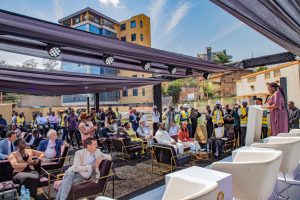In a landmark push to sanitize its troubled mineral sector, Uganda has officially opened Euro Gold Refinery—a state-of-the-art facility designed to curb gold smuggling, improve transparency, and channel more revenue from the country’s vast mineral wealth into government coffers.
Commissioned in the heart of Kamwokya, Kampala, the refinery becomes the first officially recognized by the government and marks a major shift in how Uganda handles one of its most valuable natural resources. 
The refinery is spearheaded by Ugandan entrepreneur Feni Benard and backed by foreign investors from the UK, UAE, and India. It aims to streamline gold sourcing from small-scale miners in districts such as Karamoja, Buhweju, Busia, Kassanda, and West Nile—eliminating exploitative middlemen and introducing a new level of traceability in the gold supply chain.
“This facility provides an opportunity to formalize the gold sector, curb fraud, and ensure Uganda earns what it deserves from its mineral wealth,” said Dr. Ruth Nankabirwa Ssentamu, the Minister of Energy and Mineral Development, while presiding over the launch.
She challenged the refinery’s leadership to build skilled local teams and engage with the Bank of Uganda, especially under the 2024 Domestic Gold Purchase Programme—a bold initiative to strengthen national reserves through locally refined gold.
A Sector Ripe for Reform
The opening of Euro Gold Refinery comes against a backdrop of mounting scrutiny over Uganda’s mineral trade. A scathing 2024 Auditor General’s report revealed that gold worth over $3 billion (Shs 11 trillion) had been exported without official licenses, contravening Uganda’s Mining and Minerals Act. 
The scandal deepened earlier this year when the Criminal Investigations Directorate (CID) uncovered widespread fraud networks involving rogue security officers and fake gold dealers. At least 24 security operatives were arrested for allegedly orchestrating elaborate scams that preyed on foreign investors with promises of fast-track gold deals.
“Gold has the potential to change Uganda’s economic fortunes if managed well,” Dr. Nankabirwa said. “This refinery will ensure that the days of unscrupulous dealers and illegal exports are behind us.”
The refinery also aligns with a broader government policy shift that began in 2021, when President Yoweri Museveni signed into law a ban on raw mineral exports. The aim is to foster local value addition and ensure that Uganda benefits from its mineral wealth beyond extraction.
A Vault for East Africa’s Gold
Benard, the director of Euro Gold Refinery, said the facility adheres to the highest international standards and has been approved by the London Bullion Market Association (LBMA), a global benchmark for gold and silver trading.
“Our refinery is approved by the LBMA, meaning we meet international standards for refining and trading gold and silver bars,” he said.
“We want to empower small-scale miners by giving them fair value for their gold while promoting sustainable and environmentally friendly practices.”
Beyond refining, the facility also provides assaying, smelting, and consultancy services, with a growing network of clients across Uganda and the Democratic Republic of Congo. It is also a licensed mineral dealer and holds a 79.8 square kilometer mining concession in Yumbe District, with additional exploration rights secured in Karamoja.
A Golden Future?
Uganda’s gold trade is booming. Between June 2023 and June 2024, gold exports surged to $3.09 billion, nearly half of all non-coffee exports. By early 2025, gold had surpassed all other commodities to become Uganda’s top foreign exchange earner, contributing 37% of total export revenues.
















